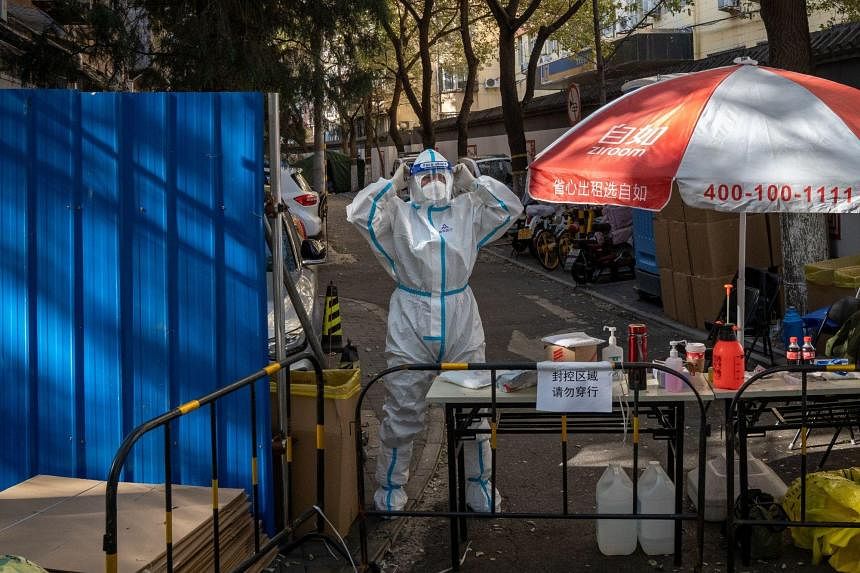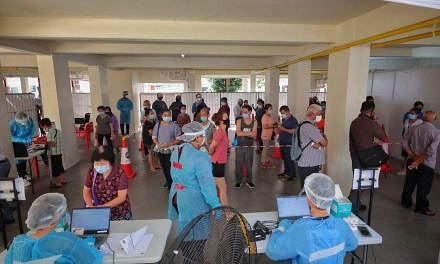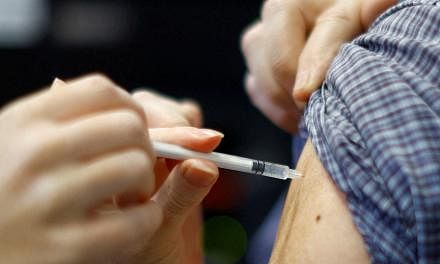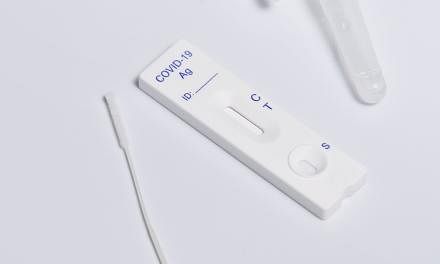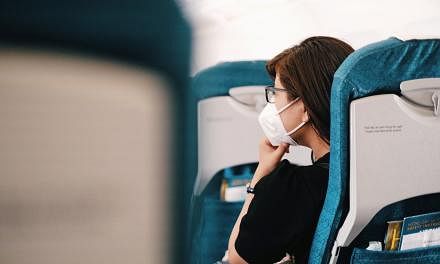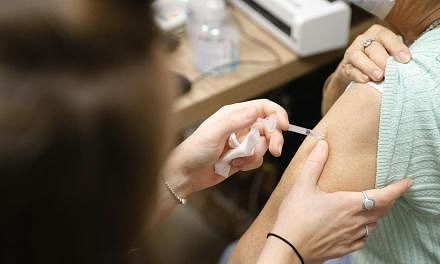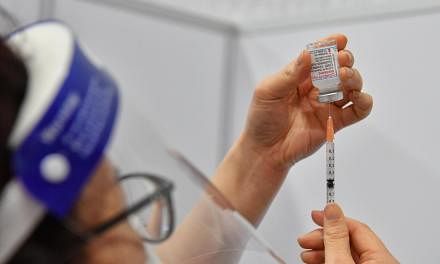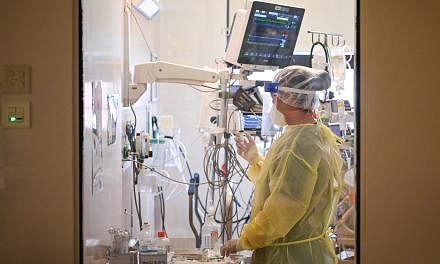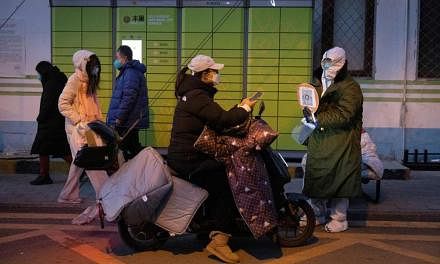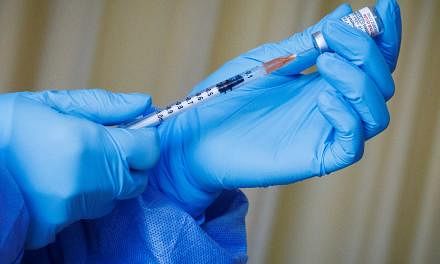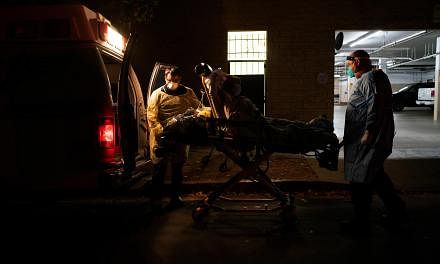BEIJING - Beijing shut parks and museums on Tuesday and Shanghai tightened rules for people entering the city as China grapples with a spike in Covid-19 cases that has deepened concern about the economy and dimmed hopes for a quick reopening.
China reported 28,127 new local Covid-19 cases nationally for Monday, nearing its daily infection peak in April, with infections in the southern city of Guangzhou and the south-western municipality of Chongqing accounting for about half of the total.
In Beijing, cases are hitting fresh highs every day, prompting calls from the city’s government for more residents to stay put and show proof of a negative Covid-19 test, not more than 48 hours old, to enter public buildings.
There were two new deaths attributed to Covid-19 by health officials, compared with three over the weekend, which were China’s first since May.
In Shanghai, the government said people who have stayed in the city for less than five days would not be allowed to enter public places such as restaurants, bars, shopping malls, supermarkets, indoor gyms from Nov 24. They can still go to offices and use public transport, it said.
New arrivals will also be required to undergo an extra nucleic acid test on their fifth day in the city, after a previous three tests during their first three days, according to the Shanghai government.
Elsewhere in China, more cities resumed mass testing for Covid-19.
“Some of our friends went bankrupt, and some lost their jobs,” said a 50-year-old Beijing retiree surnamed Zhu. “We can’t do many activities we intended to do, and it is impossible to travel. So we really hope that the pandemic can end as soon as possible.”
The latest wave is testing recent adjustments made by China to its zero-Covid-19 policy, which asks the authorities to be more targeted in their clampdown measures and steer away from the widespread lockdowns and testing that have strangled the economy and frustrated residents.
Tianjin municipality near Beijing on Tuesday became the latest to order citywide testing, after a similar announcement on Sunday by the northern city of Shijiazhuang.
Even after the tweaked guidelines, China remains a global outlier with its strict Covid-19 restrictions, including borders that remain all but shut nearly three years into the pandemic.
Tightening measures in Beijing and other cities, even as China tries to avoid citywide lockdowns such as the one that crippled Shanghai earlier in 2022, have renewed investor worries over the economy and prompted global stocks and oil prices to slip overnight.
Nomura analysts said on Tuesday their in-house index estimated that localities accounting for 19.9 per cent of China’s total gross domestic product were under some form of lockdown or curbs, up from 15.6 per cent last Monday and not far off the index’s peak in April during Shanghai’s lockdown.
The government argues that President Xi Jinping’s signature zero-Covid-19 policy saves lives and is necessary to prevent the healthcare system becoming overwhelmed.
But many frustrated social media users drew a comparison with maskless fans at the World Cup international football competition, which began on Sunday in Qatar.
“Tens of thousands in Qatar don’t wear masks. And we are still panicking,” wrote one user on the Weibo platform.
Beijing on Monday warned that it is facing its most severe test of the pandemic, and tightened rules for entering the city, requiring arrivals from elsewhere in China to undergo three days of Covid-19 testing before they are permitted to leave their accommodation.
Numerous Beijing residents have seen their buildings locked down, although those restrictions often last just a few days.
Some residents said grocery deliveries were slow because of heavy volumes while many museums were closed, and venues such as the Happy Valley amusement park and the Chaoyang Park, popular with runners and picnickers, said they would shut.
Beijing reported 1,438 new local cases for Monday, up from 962 for Sunday, plus 634 more for the first 15 hours of Tuesday.
Chinese Vice-Premier Sun Chunlan, who has spearheaded the zero-tolerance policy, visited Chongqing on Monday and urged its authorities to adhere to the measures and bring the outbreak under control.
China’s economy faces one of its slowest growth rates in decades. A property bubble has burst, youth unemployment recently hit record highs, and the private sector has been paralysed by virus rules and a series of crackdowns on industries that Beijing says had seen “barbaric” expansion.
Investors had hoped that China’s more targeted enforcement of zero-Covid-19 curbs could herald more significant easing, but many analysts are cautioning against being too bullish.
Experts caution that full reopening requires a massive vaccination booster effort and a change in messaging in a country where the disease remains widely feared. The authorities say they plan to build more hospital capacity and fever clinics to screen patients, and are formulating a vaccination drive.
Many businesses, especially customer-facing ones, also fear they may not survive until next year as customers continue to hold tight to their cash.
“The real picture may not be as rosy as it seems,” Nomura analysts said in a separate note, adding that they expect a reopening to be sped up only after March 2023, when the reshuffle of China’s top leadership is completed.
“Reopening could be back and forth as policymakers may back down after observing rapid increases in cases and social disruptions... Local officials may be even more reluctant to be the initial movers when they try to sound out Beijing’s true intentions,” Nomura wrote. REUTERS
